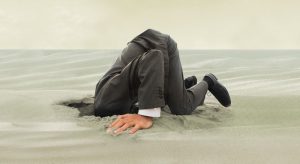“Everything worthwhile in life is won through surmounting the associated negative experience. Any attempt to escape the negative, to avoid it or quash it or silence it, only backfires. The avoidance of suffering is a form of suffering. The avoidance of struggle is a struggle. The denial of failure is a failure. Hiding what is shameful is itself a form of shame.
Pain is an inextricable thread in the fabric of life …”
– Mark Manson –

Last week I blogged about death and how we live in a society that avoids this subject to the point of delusional insanity. The response was overwhelming. What became clear amongst the many messages I received was that our collective existential angst has created a social and cultural avoidance crisis. It is difficult for us to acknowledge that life can be very painful and challenging and that we have very little control over it.
Avoidance has helped us cope and survive in life. We naturally choose the path of least resistance to escape danger or suffering. Our early childhood lessons were often about learning what, or who, to avoid in order to make it to adulthood. We have an inbred protective reflex when exposed to adverse stimuli and that is beneficial – unless it becomes driven by anxiety.
Anxiety can cause us to protect ourselves from things we perceive as threats, but often these very threats are important life experiences. We may think avoidance is a cure, not realising it can actually heighten our distress. We begin to be consumed with the very thing that we are trying to avoid. There are many examples of this. People suffering from eating disorders trying to avoid certain foods, so food and calories become their obsession. People suffering from social disorders trying to avoid encounters with others and feeling continually panicked. My previous blog on death discussed our society’s avoidance of talking about death, underscoring a primal fear that drives us to all sorts of unrealistic beliefs or behaviours, both in religious and social settings.
Mark Manson’s quote above is so accurate: “The avoidance of suffering is a form of suffering.” The more dogmatic and hostile we become in areas of our lives, the more we are struggling to avoid something unpleasant, perhaps a shadow side to ourselves. It’s an internal struggle and a form of suffering. That is why vulnerability is such an important transformational tool. When we learn to be vulnerable we begin to recognise that avoidance is not the answer. In fact, avoidance comes at a very high price as we barricade ourselves from life’s inevitabilities and our own flaws.
Facing our fears takes courage. In a society that is caught in an avoidance crisis as it pursues experience after experience to feel ‘better’ or ‘happy’, it takes guts to stop, reflect and become counter-cultural. We need to learn to build our tolerance to things that are challenging, painful and uncomfortable. It is in the full embrace of life, with all its ups and downs, laughter and tears, that we experience what it means to be truly human and to build relationships that are genuine, healthy and have longevity.
Dear reader, take a moment to think about your life. Are there areas that you are avoiding that desperately need your attention? Are you sidestepping conversations because even though they are important and should not wait any longer, you know they will be difficult and awkward? Are there shadows you need to face that you have denied?
Avoiding avoidance is risky. Will it all go well when you stop running and turn around? I don’t know. “It all going well” is not what life is about. Life is raw, risky and at times filled with peril. We become vulnerable and our Jenga blocks, sometimes built on lofty ideals and a protective guise, can all topple over … and then we have to rebuild … one honest, humble, vulnerable block at a time …
“Pain in this life is not avoidable, but the pain we create avoiding pain is avoidable.”
– R.D. Laing –

Another fantastic, thought-provoking
Thank you, Melissa.
An important concept to consider when raising children.